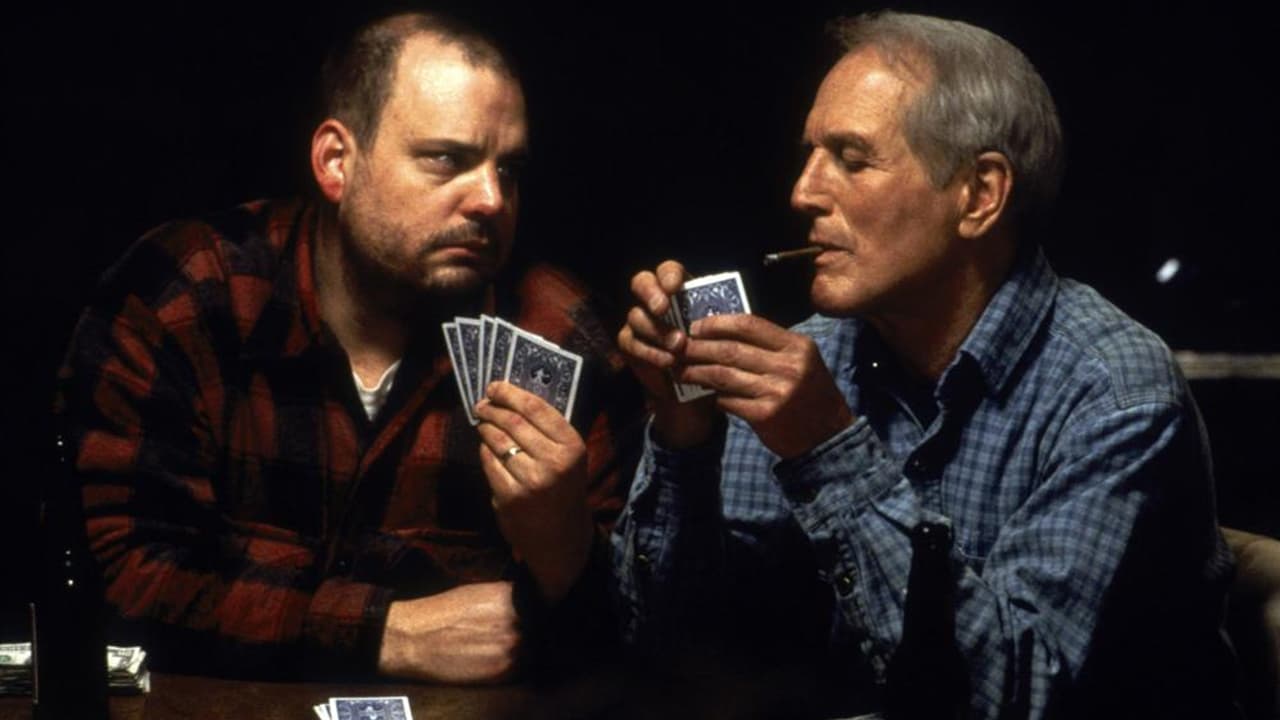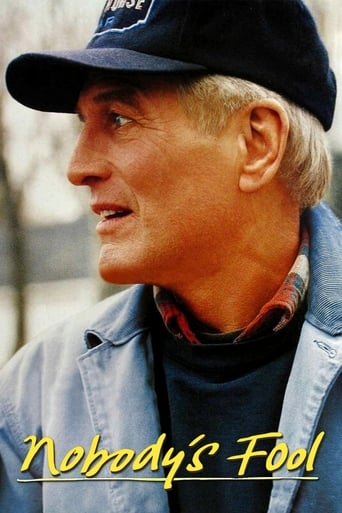

Nice Man ... That Sully .... Sure he has his bad days... a lot of them ! But he is learning as he goes and trying his best to be true to himself and to his friends and family. He is re-meeting his son and meeting his grandson and learning .. always learning.One of the best characters, for me, is Sully's friend Rub Squeers ... wonderfully played by Pruitt Taylor Vince. I know this character actor only as LaRouche on "The Mentalist" and found his performance outstanding. Jessica Tandy !!! What more needs to be said ?Melanie Griffith is terrific as Toby.. both flirter and flirtee with Sully.Bruce Willis is .. well .. Bruce Willis, as usual, with a bit of a twist.Even the Doberman is entertaining and the grandson is tolerable... the other crummy one is disposed of early in the story. ! All in all .. a generally good movie and worth seeing ! Bring Kleenex.
... View MoreThis is a brief review of "Nobody's Fool" (1994) and "Twilight" (1998), two films by director Robert Benton, both starring Paul Newman.The better of both films, "Nobody's Fool" stars Newman as Donald Sullivan, an elderly man who lives in small-town America. Perpetually down on his luck, "Fool's" first act watches as Sullivan struggles to claim unpaid wages. For the next hour, things only get worse for Sully: he loses bets, loses money, almost loses his leg, is revealed to be estranged from his family and gets thrown into jail.The film's great joke, though, is that Sully is never sullen. Always giving as good as he gets, Sully repeatedly steals machinery from his boss, and flirts with his bosses wife (Melanie Griffith). As the film progresses, we the audience also begin to appreciate just how many people rely upon the "unlucky" Sully, how lucky they are to have him in their lives, and how upstanding a guy he is when compared to many others in his community.Which is not to say Sully is without flaws. Indeed, "Nobody's Fool's" climax features the usual "improvements" and "reconcilliations" typical of the genre. Sully learns to be a better man, a better father, and attempts to correct mistakes in others he once committed himself. This is all painfully routine. Where the film shines is in Newman's lovable performance, Benton's ceaselessly witty dialogue, and his willingness to sympathise with major and minor characters which lesser films typically villainize.Released four years later, "Twilight" again stars Newman. This time he plays Harry Ross, an ex-cop and one-time private detective. Like "Nobody's Fool", the film's first act watches as Newman damages his leg. Again like "Nobody's Fool", the film then begins to question the impotency and disloyalty of its lead character.Throughout "Twilight", Newman plays a now familiar archetype: the ageing private detective. He's an old timer, washed up, and mocked by all. To make matters worse, everyone believes that Ross lost his penis in a gunfight. Ross' presumed impotency is mirrored to the film's other ageing characters: a washed up actress (Susan Sarandon) in her twilight years, and a dying actor (Gene Hackman), both of whom are friends with Ross. The film's moral dilemma hinges around all three characters. Did Hackman and Sarandon collude to kill a man, is Ross helping them, and more importantly, will he cover-up a murder to protect a friend? To say anymore would be to spoil the fun."Twilight" is set in California, home of many great sun-bleached noirs. It's also home to Benton's earliest noir, "The Late Show", a 1977 feature which starred Art Carny as Ira Wells, an ageing private detective who, like Harry Ross, is accused of being long past his sell-by date. Both films allow their ageing heroes one final blaze of glory. Both films are also unable to transcend the conventions of their genre. "Twilight's" climax in particular is rife with clichés.8.5/10 - See "Cutter's Way" and "Flesh and Bone" (1993).
... View MoreWell, maybe two. Or maybe three.Everything was perfect, except for the cinematography. Maybe that was the cinematographer's fault or maybe it was the director's fault. Or maybe it was the editor's.There is a quote from John Ford about why he didn't like to use close-ups. His response: I use them when I think they're necessary, but generally they're all that necessary. Or something to that effect.And he was right. I dare you to name a John Ford film with a lot of unnecessary close-ups.There are are very, very few long shots in this movie. Consequently, you don't get get to see the characters interacting with each other simultaneously. My impression of this film is that is mostly an interminable series of jarring close-ups of 1-2 seconds: close-up of one character saying something, followed by the recipient's reaction, and back and forth ad nauseum. Almost enough to make you sea-sick.Consider the feeling that long shots would have imparted when you watch this otherwise great film, when you could see two or more characters interacting simultaneously. You never get to see that in this film. You get the impression that each actor was hauled before the camera alone to recite their lines and react appropriately, all for a second or two or three, then the camera switches back faster than stink to the character they're supposed to be talking to. Not a long shot to be seen.John Ford aside, consider the way Frank Capra shot films. A Capra-esque feeing about this film has been noted before. Same philosophy as John Ford. When you see James Stewart saying something, you see Donna Reed's reaction at the same time. Long shot.That's what's missing from missing from this movie. Bad framing throughout. It's hard to place the blame: Was it Robert Benton (director), James Bailey (cinematographer), or John Bloom (editor)? Hard to pinpoint.Otherwise a wonderful, if flawed film (reasons noted above).
... View MoreNobody's Fool comes from that breed of easy, quaint small-town character dramas that are warm and enjoyable while you watch them but you know you're going to forget about entirely by the next day. It's a very nice, comfortable viewing but there's not really anything in it that will make it last. The story focuses on Sully, played by Paul Newman with excellent world-worn weariness, and his interactions with the many different people living in his small town around Christmas time.Within the first half an hour you can guess where everything is going to end up, and you wouldn't be far off on any of it. It's definitely not the kind of film that you're going to be thinking about after it's over, but it's nice and easy while you're watching it. It also suffers from "way too many" endings syndrome, where the last half hour is basically one scene after another of big emotional payoffs with Sully wrapping up his story with each individual character and it's kind of brutal to get through, but the whole thing is made slightly better than it would have been with a group of quality performances.Jessica Tandy delivers her last screen performance and it's one of genuine charm and presence that I enjoyed thoroughly, and it's great to see Bruce Willis take on the role of a total sleezebag whose teeth you want to knock down his throat the moment you meet him, but the film undoubtedly belongs to Newman. Sully is the kind of old rascal that you love to root for even when he's making mistakes, and it's the type of character that Newman has made a career out of excelling at. He's a "born loser", as it were, but he plays it with such a warm heart that you can't help but smile watching him.Sully is a cantankerous old man and Newman plays him with the appropriate amount of anger, resentment and arrogance, but there are small moments, like the one where he lets his grandson drive his truck on his lap and a big smile comes across his face, where he lights up the room and you can see the potential of this man.In a lot of ways, Sully feels like the appropriate evolution of those cocksure heroes that Newman found himself playing often in the '60s, and he mixes this one with that same blend of charisma and human flaws that made him the icon he is. He would still act for another decade after this, delivering a few more quality performances, but this one felt like the ultimate swan song for one of the great American actors and it was one wholly appropriate for his skill and inspiration.
... View More